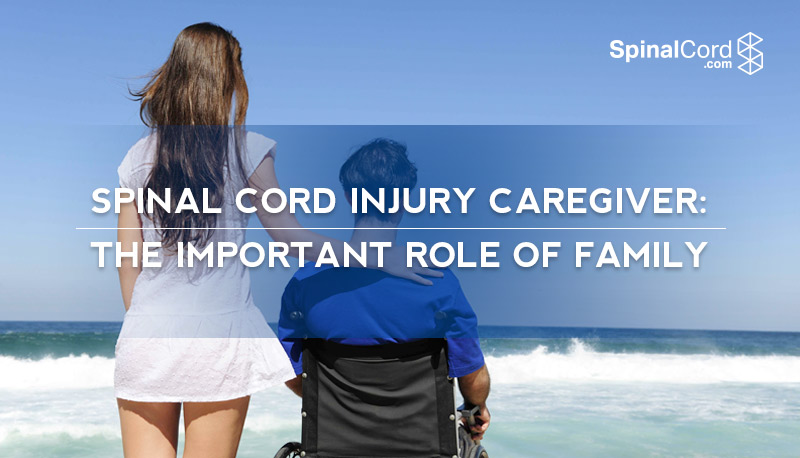Spinal Cord Injury Caregiver: The Important Role of Family

Let's face it: the role of a spinal cord injury caregiver for a loved one can feel like a profoundly isolating experience. But you are not alone. Sixty-five million people—nearly a third of the population—provide care for an injured or disabled loved one.
Your role in your loved one's prognosis is critical, and without you, he or she might not be able to recover at all. But if you want to be an excellent caregiver, you have to care not only for your loved one but also for yourself. Burnout is real, and can give rise to a host of challenges ranging from depression and exhaustion to chronic illness.
The overwhelming majority (66%) of caregivers are women, and more than a third care for two or more people, so it's no wonder that caregiving is so stressful! After all, being a spinal cord injury caregiver is valuable work. If you were paying another person to do it, you could pay a small fortune. In 2009, AARP valued the unpaid labor of family caregivers at $450 billion per year.
The work you are doing is hard, and it matters.
Why Family Matters on the Recovery Journey
Your loved one's spinal cord injury isn't just a physiological issue. It also fundamentally alters the way he or she functions and interacts in the world. There is a new found difficulty with daily tasks, potential for chronic headaches, and with the specter of recurring pain and long-term disability looming large, it's no wonder that so many people who have suffered a spinal cord injury struggle with depression.
Depression isn't just an inconvenience; it's a serious medical issue that can slow the healing process and make your loved one's symptoms worse. You can't cure depression away and no one can single-handedly prevent it. What you can do is provide loving support. Research consistently finds that people with plenty of social support are less likely to get depressed.
Your loved one also needs you just to get through the practical realities of daily living. Bathing, dressing, preparing food, managing pain, sticking with a physical therapy regimen, and remembering to take prescription medications, can all prove challenging for someone who has suffered a spinal cord injury. Your support to accomplish these tasks really does matter. Better still, providing support in the early days may equip your loved one with the skills, sense of self-efficacy, and hope he or she needs to persist even when recovery gets challenging.
The Reality of Caregiver Stress
If you're overwhelmed by the realities of daily care, you might worry that your own exhaustion makes you selfish. Or maybe you're just not sure how to juggle all of your responsibilities. Caregiver stress isn't just common; it's a normal reaction to having your entire world turned upside down. Half of all caregivers qualify for a diagnosis of depression—a figure that should remove any doubt from your mind that caregiving is immensely challenging. Some of the struggles you may experience include:
- Guilt over your inability to do more.
- Frustration and resentment. You may feel that your loved one is unfair, resent him or her for not taking more steps to avoid being injured, or feel angry that other family members aren't helping.
- Financial anxiety.
- Stress about the challenges of managing medication, medical bills, and advocating for your loved one.
- Time constraints; you may find you no longer have time for hobbies you once enjoyed. This can create a ripple effect, slowly eroding your happiness and sense of self at the very moments that you most need the relaxation of a beloved hobby.
- Isolation; you might not spend as much time with family and friends as you once did, and you may be frustrated when they don't make an effort to reach out to you.
- Health issues; stress can tear down your immune system, and chronic stress can lead to muscle pain, headaches, gastrointestinal problems, and a host of other health challenges.
How to Juggle Your Roles
It's easy to paint a grim portrait of life as a caregiver, but there's also a flip side: caregiving work is inherently rewarding. It may even mean the difference between life and death for your injured loved one. Your role as a caregiver does not mean you have to give up your own life. Instead, you need to keep trying options until something works. You might find, for instance, that therapy by itself isn’t helping you, but that therapy works wonders when combined with exercise and a quality support group.
Feeling less alone is often the key to coping with the demands of caregiving. If you're strapped for time, consider an online support group. Begin your search for such a group here. If you'd prefer in-person support, ask your loved one's doctor about local options. Your hospital or rehab center likely runs a support group.
If you're feeling run-down, exhausted, and overwhelmed, consider finding a therapist. Therapy can help you learn to better manage your emotions, allow you to eliminate habits that make caregiving more challenging, help you re-frame your thoughts and offer you practical advice about how to manage the challenges of your daily existence. And when your world is centered around caring for someone else, taking an hour or two a week to focus on yourself can make a huge difference in your overall well-being, which in turn will help you be a better caregiver for your loved one.
Remember, you cannot care for someone else if you're exhausted, depressed, and miserable. Those feelings will rub off on your charge, fostering resentment in both of you. Some research-backed strategies that may help you cope with your stress include:
- Preserving time each day for at least one activity you love.
- Spending time out of your home each day, ideally doing something you enjoy.
- Eating a healthy, balanced meal; skipping meals promotes stress.
- Getting at least 150 minutes of aerobic exercise each week, and supplementing this with at least two days of strength training. Strength-based programs such as yoga and pilates can be particularly effective at combating stress and eliminating stress-based chronic pain.
- Cultivating mindfulness—the act of living in the present moment. Worrying about the future or fixating on when your loved one will get better often only compounds stress.
- Meditating for at least 20 minutes a day.
Every caregiver is different, and what worked for someone else who is caring for a spinal cord injury patient won't always work for you. Don't be afraid to experiment, and to prioritize your own well-being. When you care for yourself, you're better equipped to care for the person you love. Moreover, a loved one's injury does not and should not mean that you have to stop living a rewarding and meaningful life. You matter. Your loved one's injury hasn't changed that. And the more you embrace that, the better life you will both be able to lead.
For some help with organizing the multitude of new responsibilities on your plate, check out our traumatic injury resources guide. This extensive list includes digital tools that will simplify everything from managing pills to keeping track of appointments.
Stay Updated on Advancements On Traumatic Brain &
Spinal Cord Injuries
About the Author





